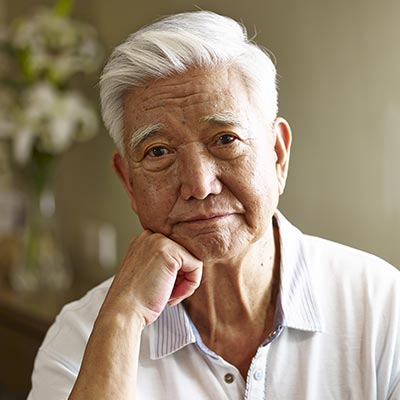End of Life Care
Giving Acceptance, Support and Comfort
As an individual prepares for the final stages of life, they will go through many physical changes as the body “slows down” and prepares for dying. It is important for caregivers to understand what these changes are, and that everyone’s situation is unique. Not everyone will show the same signs and symptoms.
End of life care refers to the final hours or days of an individual’s life. In this way, ‘end of life care’, while part of palliative care, is different in scope. Palliative care focuses on improving the quality of life and quality of care for patients after they have been diagnosed with a terminal or advanced illness. Managing pain and helping individuals and families understand the physical, emotional and psycho-social changes are a key part of palliative care.
What You May Observe at End of Life
The following end of life changes are presented in the order in which they usually appear, but may occur for many days prior to death. Some practical advice and comfort measures are also included that may help caregivers.
When someone is dying they may sleep longer and sometimes have difficulty waking.
This is due in part to changes in the metabolism of the body. They may also appear to be sleeping with open eyes. As caregiver, you can…
- Sit with them and hold their hand, speaking softly and naturally.
- Plan conversation for times when they are more wakeful and alert.
- Keep visiting times brief or encourage visitors to sit at bedside.
- Speak directly and normally, even though there may be no response. Never assume someone cannot hear, as hearing is thought to be one of the last senses to be lost.
An individual at end of life will reduce what he or she eats and drinks.
It is important for caregivers to…
- Understand that the body will naturally begin to conserve energy which is expended in these tasks.
- Offer small servings of light foods, decrease food portions as requested, and encourage but not force fluids.
- Be aware of the decrease in swallowing ability, and gently remind the individual to swallow.
- Keep the person’s mouth moist and comfortable. Small chips of ice, frozen juices or popsicles may be refreshing.
An individual may become confused and unable to recognize familiar people and surroundings.
In this occurs it is important to…
- Speak calmly, clearly, and naturally.
- Remind them of the time, place, and who is in the room.
- Gently manage resistance to those things that provide comfort by communicating reasons. For example, “It’s time to take your medication so you won’t begin to hurt.”
An individual may experience, see or talk to deceased family members, or use symbolic language (e.g., talk about “going home”).
When this happens…
- Allow the person to express their experience, and be reassured that this behaviour is normal.
- Understand that they may become restless and pull at bed linen and clothing.
- Avoid physical restraint, if possible.
- Consider playing calm and soothing music or giving a gentle massage to ease their restlessness.
- Call the family doctor if home safety becomes a concern.
An individual may have changes in breathing, such as irregular or shallow breathing and "wet" breathing or congestion.
It is quite common to have 10 to 30 second periods when breathing may stop. The person may also have periods of rapid, shallow panting type breathing. Sometimes there is a moaning-like sound on exhale. This is not distress, but the sound of air passing over relaxed vocal chords. Be reassured that these patterns are very common and indicate a decreased circulation in the internal organs.
A caregiver can assist by…
- Elevating the head and/or turning the person onto one side may bring comfort.
- Hold his/her hand; speak gently and reassuringly.
An individual may have saliva collecting at the back of their throat.
These secretions cannot be swallowed because of weak muscles, or there may be secretions in the lungs producing loud gurgling sounds from the chest.
Other physical changes at end of life.
- Irregular pulse or heartbeat (a normal pattern which indicates the “slowing down” process).
- Loss of control of bladder or bowels. Consult with your nurse for appropriate care required.
- Changes in temperature or colour which indicate circulation is conserving to support the most vital organs, or the possibly the brain sending unclear messages. Keep the person warm, or provide a light sheet if he or she removes the covers.

Final moments and saying goodbye
A dying person will often try to hold on, even though it brings prolonged discomfort, in order to assure that those left behind will be all right. A family’s ability to reassure and release the dying person from this concern is the greatest gift of love they can give at this time. When the person is ready to die, and the family is able to let go, this is the time to say good-bye in personal ways. It may be helpful to just lay in bed with the person, hold a hand, and/or say what you need to say. Tears are a natural part of making peace and saying good-bye.
At the time of death there will be no response, no breathing and no pulse. The eyes will be fixed in one direction and they may be open or closed. The mouth may fall open as the jaw relaxes, and their may be loss of control of bladder or bowels.
Grief Support
Children
Children need special care when faced with the loss of a friend, parent or other family member. Our grief support for children 6 to 12 years is offered on an as-needed basis for as long as a family needs our services.
Teens
Teens can feel helpless and vulnerable when experiencing emotional pain associated with grief. Our hospice support for adolescents and young adults 13 years and older is flexible and tailored to each teen’s needs.
Adults
Adults living with grief cope with strong and unfamiliar emotions. Our wide variety of tailored support options are designed to provide both one-on-one and group support care in a relaxing and open environment.
Families
Families often need emotional, practical or spiritual support when coping with loss. Our registered clinical counsellors and trained volunteers are there to listen, understand and help each family member.
| Title | Address | Description | ||||||
|---|---|---|---|---|---|---|---|---|
Peace Arch Hospice Society |
15435 16a Ave, Surrey, BC V4A 1T2, Canada |
Supportive Care Centre |
||||||
Peace Arch Hospice Society Thrift Store |
15562 24 Ave #2a, Surrey, BC V4A 2J5, Canada |
15562 24th Avenue Surrey, BC V4A 2J5
|
||||||
Peace Arch Hospice Society
15435 - 16A Avenue, South Surrey
British Columbia, Canada V4A 1T2
Tel. 604-531-7484








